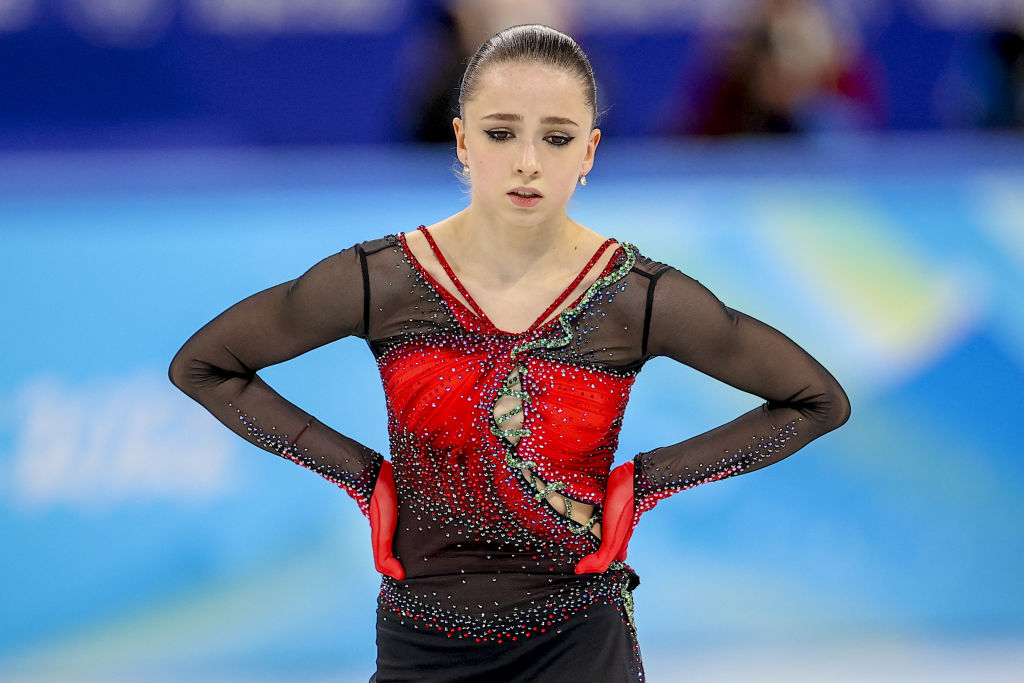
Figure skating has its share of drama, but it’s not a sport generally linked to doping. That changed at the Beijing Olympic Games in 2022, when a sample from Russian figure skater Kamila Valieva was positive for a banned substance. It’s taken two years for sport’s highest court, the Court of Arbitration for Sport (CAS), to decide Valieva’s fate.
In a decision announced on Jan. 29, a three-member arbitration panel decided to ban Valieva from competing for four years, starting retroactively in 2021, when she provided the sample at the Russian national championships. The results of that test weren’t made public until months later at the Olympics.
Valieva is disqualified from all of the events at which she competed in Beijing, including the team event and the women’s singles event. In a statement, the International Skating Union, which oversees figure skating, said that with her scores eliminated, in the team event the Russian team moves from first to third, earning bronze, while the U.S. earns gold and Japan silver. Valieva is also required to give up any medals, awards, prizes, or profit she received since the positive test.
In a briefing on Jan. 30, U.S. Olympic and Paralympic Committee CEO Sarah Hirshland confirmed that after conversations with the International Olympic Committee, “we have been given very clear direction that we should proceed in awarding gold medals to the U.S. team, and that’s what we are going to do.”
The CAS decision still can be appealed. Canada finished fourth originally and would earn bronze if the Russian team is removed from the competition along with Valieva, and its skating federation said in a statement, “Skate Canada disagrees with the ISU’s position on this matter and will consider all options to appeal this decision.”
Even with that possibility, the decision brings some closure to the highest-profile doping scandal in figure skating. After the positive sample was disclosed, Russian doping officials allowed the then 15-year-old to continue competing at the Olympics, deciding that because she was so young, she shouldn’t be held responsible for mistakenly taking a banned substance. Valieva had said she unintentionally took her grandfather’s heart medication, trimetazidine. Why it took Russian doping officials so long to disclose Valieva’s positive sample isn’t clear; the delay allowed Valieva, a favorite to win gold in the women’s skating event, to compete in Beijing.
“It’s been two long years, and we deserve an answer,” Nathan Chen, who competed in the men’s portion of the team event, tells TIME. “We’re beginning to get some closure in the name of clean sport and it was definitely the right call.”
“Before today, I wasn’t really holding my breath for what I feel was the right decision to be made,” says Madison Hubbell, an ice dancer who, with partner Zachary Donohue, was part of the U.S. team. “I’m pleasantly surprised that there was no special consideration just because of her age, and she was held to the same standard of every other athlete. I feel like some of my faith in the system has been restored.”
The long wait for a resolution, however, has taken an emotional toll. “Every time people asked about our Olympic medals, there was a little bit of sadness and disappointment that we didn’t get that Olympic moment,” says Madison Chock, an ice dancer who, with fiance Evan Bates, also competed in the event. “We didn’t realize it was weighing on us the whole time until we got the resolution yesterday—it feels almost like a weight has been lifted.”
Donohue says the delay has been costly, not only emotionally, but financially as well. “The possibility of being shifted to gold medalists is life-changing, and changes the way you brand yourself and your future,” he says. “There is a financial impact of having it drawn out so much, especially since Madison and I retired that year.”
There are no details yet from the International Olympic Committee on when or where the medals ceremony for the team event will take place, but the U.S. team is hoping to have it at the Paris Games this summer. “I think that being on an actual Olympic podium is necessary,” says Donohue. “The amount of people in any country that start skating, and then make it to the Olympics, much less medal, is so small that it would be belittling to host it somewhere else. It wouldn’t be the same thing,”
Hubbell, for one, is just hoping to experience a medal ceremony with a special guest. “I’m expecting my first baby in a few weeks, and whatever celebration happens, I’m hoping to bring my daughter with me,” she says.
More Must-Reads From TIME
- The 100 Most Influential People of 2024
- Coco Gauff Is Playing for Herself Now
- Scenes From Pro-Palestinian Encampments Across U.S. Universities
- 6 Compliments That Land Every Time
- If You're Dating Right Now , You're Brave: Column
- The AI That Could Heal a Divided Internet
- Fallout Is a Brilliant Model for the Future of Video Game Adaptations
- Want Weekly Recs on What to Watch, Read, and More? Sign Up for Worth Your Time
Contact us at letters@time.com